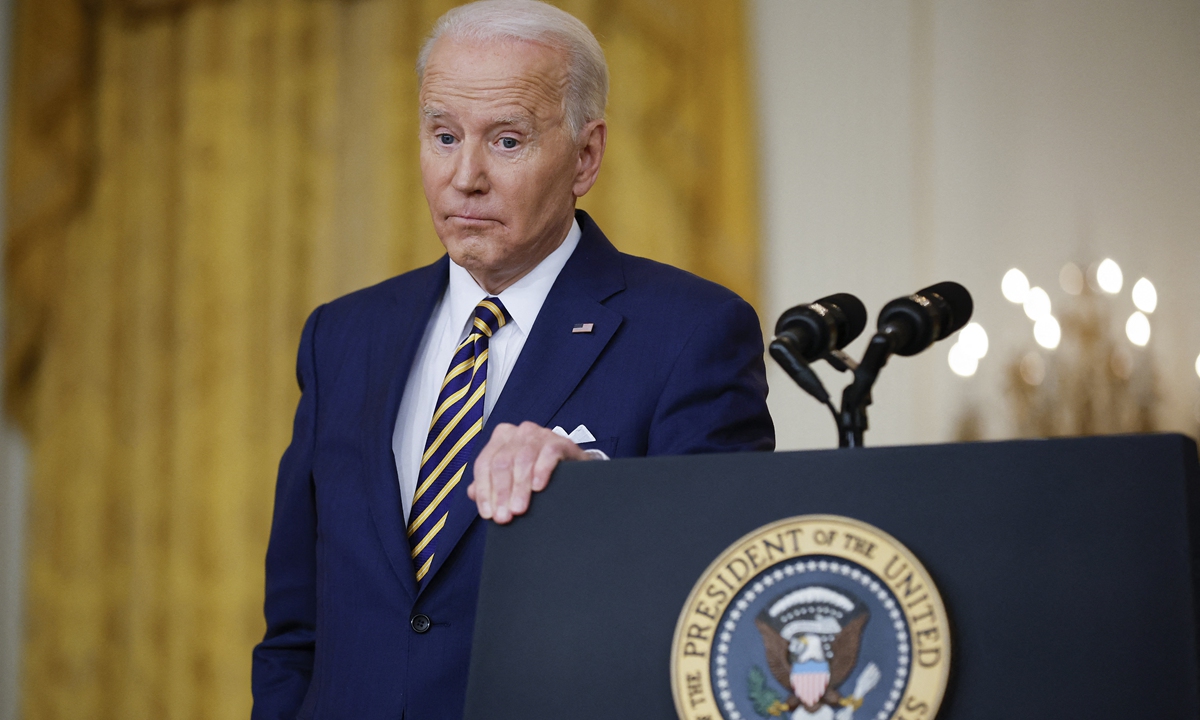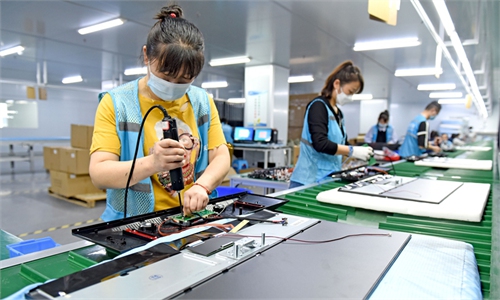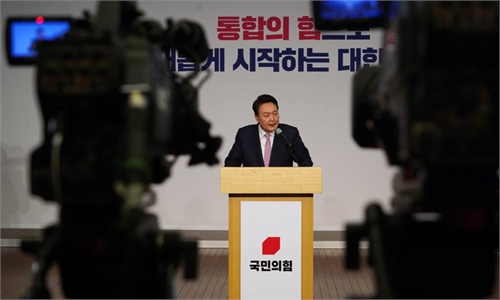Upgraded US-South Korea alliance threatens balance, security of Asia, experts warn

US President Joe Biden Photo: AFP
Although South Korea's new administration has wishful thinking to establish the comprehensive strategic alliance with the US to serve as the central axis for contributing to peace and prosperity in East Asia, the US probably would take it to the opposite to threaten regional stability, experts warned, as US and South Korean officials held an introductory call over bilateral ties before US President Joe Biden's upcoming visit to South Korea.
US Deputy Secretary of State Wendy Sherman and the South Korean First Vice Foreign Minister Cho Hyun-dong held an introductory call on Wednesday which discussed the strength of the US-South Korean Alliance and opportunities to deepen the bilateral partnership before Biden's visit, spokesperson Ned Price said on Wednesday.
Sherman stressed her desire to work closely with Cho to address the most pressing 21st century challenges, including the climate crisis, COVID-19 pandemic response, supply chain resilience, and economic security.
Sherman also emphasized US commitment to trilateral cooperation between the US, South Korea and Japan, according to the department spokesperson.
The call came as Biden gets ready for his first Asian trip on Friday since taking office.
Kim Tae-hyo, first deputy director of the National Security Office, said "The goal is to establish the comprehensive strategic alliance of the two countries as the central axis for contributing to peace and prosperity in East Asia and the world."
The so-called upgrading of US-South Korean relations is more like an expansion from political and military fields to economic cooperation and even values, Yang Xiyu, a senior research fellow at the China Institute of International Studies, told the Global Times.
However, despite wishful thinking, experts warned that South Korea's new administration should be aware that the real aim of the US to enhance its alliance with Asia-Pacific countries is to draw more countries to form a united front against Russia over the latter's conflict with Ukraine, and such a move will also help NATO's global expansion, especially to Asia, as the US has always sought to build a more effective framework to contain China in the Asia-Pacific region.
Such bilateral ties that target a third country would not do any good to South Korea, but threatens the security and balance in the Asian-Pacific regions, Wang Junsheng, a research fellow of East Asian studies at the Chinese Academy of Social Sciences in Beijing, told the Global Times..
Lee Hee-ok, a professor at the Department of Political Science and the director of the Sungkyun Institute of China Studies, was quoted by The Seoul Economic Daily as saying that the foreign policy of the Yoon administration is clear: to further deepen the strategic alliance between South Korea and the US. In particular, it is to participate in the US-Japan-Australia-India Quad dialogue and join the Indo-Pacific Economic Framework.
"While it is important for South Korea and the US to promote their alliance, they should also maintain autonomy in their relations with China to secure economic benefits," Lee noted.
The US wants to create an Asian NATO, through bilateral alliances, the trilateral AUKUS deal, the Quad, and the Five Eyes alliance, which are all aimed at China. It depends on how Asian countries and regions choose, Zheng Yongnian, a professor of political science at the Chinese University of Hong Kong (Shenzhen), previously told the Global Times.
Zheng warned that Asian countries need to think about whether Asia's security should be achieved by relying on foreign powers or by establishing an order within Asia itself. Europe has already provided lessons.
The EU is a security force in Europe but NATO is not. Europe would be more peaceful if it had only the EU and no NATO as the alliance is dominated by the US. It is debatable whether it caused peace or war in Europe. The negative effects of the Russia-Ukraine conflict have to be borne by European countries, not the US. Asian countries should see this clearly. If an Asian NATO comes into being, there will never be peace in Asia, Zheng noted.
South Korea's state intelligence agency, the National Intelligence Service, said earlier this month that it has joined the NATO Cooperative Cyber Defense Center of Excellence as the first Asian member, according to Yonhap.
South Korean Foreign Minister Chung Eui-yong was in Brussels to attend a meeting of NATO foreign ministers in April. He was the first South Korean foreign minister to join a high-profile NATO session, Yonhap reported. Aside from South Korea, three countries - Japan, Australia and New Zealand - also attended the NATO session. Nikkei Asia reported this was the first time a Japanese minister attended such a meeting.
By gathering NATO and US allies in the Asia-Pacific at the NATO meeting, NATO will become a platform for the US to lead its global allies and realize its expansion from Europe to the Asia-Pacific, analysts said, noting that NATO's expansion is the root of the current conflict between Russia and Ukraine, but the bloc never reflects on its problems and is still working to expand.



